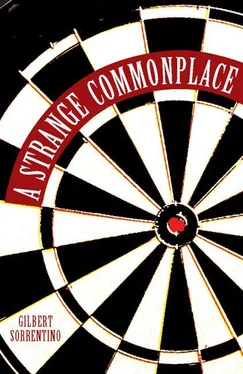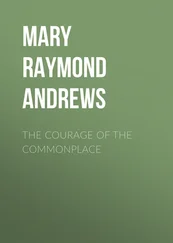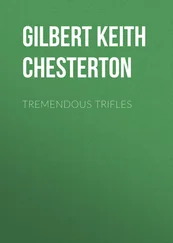They lay in bed watching what looked like a children’s show. Santa Claus and Mrs. Santa Claus and their elves and helpers grinned and rushed about, but the sound was so low that their dialogue was unintelligible. Ralph lit another cigarette. Santa Claus in horn-rimmed glasses, he said, for Christ’s sake. Jenny looked over at him. She was in her slip. There was a water stain in the corner of the ceiling. What class, Ralph said, well, it’s not the St. Francis, but this wasn’t exactly an— amour, was it? However you want to slice it. Was it? You are a real bastard, she said. What? he said, I’m a real bastard? Didn’t you suggest this place and drive us here? Now you think — what? — I’m supposed to be a tender lover? She put out her cigarette and got out of bed, picked her panties up from the floor and went into the bathroom. You’ve got a run in your stocking, he said, as she closed and locked the door. All the folks in Santa’s North Pole house were singing happily, then they disappeared and another Santa appeared, selling Coca-Cola. I hope to Christ that Billy blames the fucking chess set on her, he said to Santa.
The baby woke up, climbed down from bed, and walked out of the bedroom and into the kitchen. She stood in the doorway and was frightened to see Uncle Bill jumping on Mommy on the table, they were bumping and making noises. She began to cry very loudly. Bill, stop! Inez said, Bill! Not now, not now, he said.
Jenny pulled up in the battered and dirty station wagon across the street from the little frame house. Home again, home again, jiggity-jig, Ralph said. Do we need any booze? I can run down to the corner, is it? They ought to still be open. I could use the air anyway. Ralph bought some yesterday, Jenny said, scotch and gin. He’s drunk already anyway from the office party, he’ll be teary and embarrassing and telling Inez how wonderful she is, how pretty, how wonderful, what a great mother. Wonderful. You think we can order Chinese tonight? Ralph said. Or pizza? Don’t kill yourself cooking? She smiled at him, then nodded toward the house. No lights in the front room, she said. Bill must be home and they’re both in the kitchen getting plastered. Ho ho ho, Ralph said.
JACK GOT HOME ABOUT 8:30, WELL AFTER DARK. ANNA WAS sitting at the kitchen table, reading another drugstorelibrary novel by Fanny Hurst or Faith Baldwin, some ladies’ hogwash. Was that all she did all day? His place was set and his supper was on the kitchen counter, all of it cold. Is that my delicious supper? he said, and she looked up from her book as if suddenly aware of him, and then at her watch. Oh, I get it, he said. Let’s see, a cardboard pork chop sitting in fat, Ann Page carrots and peas, mmm, and what’s this? plaster? oh, mashed potatoes à la skins and lumps, a gravy boat full of, uh-huh, grease! And, of course, a luscious salad with a bright orange gourmet dressing. I can’t wait. The kid’s in bed, I suppose, God forbid you should keep him up a few minutes so he can see his father. Anna looked up again from her book and asked him where he’d been, he said he’d be home for supper, my God, you can’t spare an hour for your son on a Saturday? He sat down at the table and tapped his finger on the edge of his dinner plate, wise and patient and tolerant. He’d been watching a softball game at the playground between Fritz’s Bar and Grill and Papa Joe’s, the kid hates softball, he said. He said that then he went to the movies, the kid is scared of the movies, for God’s sake. Her mouth was twisted in the bitter smile that enraged him. And you saw? she said. Oh, he said, you want to know what I saw? Well, I saw Three Men on a Horse and If You Could Only Cook and Come and Get It and Red Dust and Dawn Patrol and how can I forget Tarzan of the Apes? Starring Edward Everett Horton, Edward Arnold, Edward G. Robinson, Edward Brophy, Edgar Buchanan, Edgar Kennedy, Eduardo Ciannelli, and — Akim Tamiroff! I think Jean Harlow was in one of them, too. What a movie — passion, action, betrayal, temptation, fury, danger! She put a paper napkin in her book and closed it, then stood up. She was pale, then she suddenly reddened and paled again. Charlie thought you’d have a catch with him in back or take him for a walk down to the shore through the park, it’s Saturday. She was shaking with anger. You’re a mean, rotten father! Oh, he said, it wasn’t that she cared about herself, not a bit, just about the son he ignored, not, oh no, not herself! She was a martyr, a selfless wife, a saint who put up with his neglect of her with a smile on her face, her nose in a book, her hair in snarls, and her body in an old stained housecoat with tattered stockings rolled down to her knees like the super’s wife from Bulgaria, Jesus. I can smell her on you, Anna said, her five-and-ten perfume and her sweaty, dirty dress, you don’t have, you’ve got, you haven’t one iota of self-respect or shame coming home smelling of that tramp, my mother was right about you, she was always right about you, you dirty guinea! She turned and started out of the room, her novel under her arm, and he picked up the gravy boat and threw it against the wall, cold gravy and shards of china everywhere. The other movie I saw, he shouted after her, was fuck you and your drunken mother! He saw blood on his shirt and realized he’d somehow cut his hand. He’d never said, never, he was sure, that he was going to have a catch, the kid couldn’t catch a ball with a basket with his cockeye. He reached into his jacket pocket and pulled out a pack of Philip Morris. Irene’s cigarettes, he’d taken them and left his Luckies by mistake. You better get them off the night table, honey, before the old man gets home, he muttered.
THE OLD MAN HAD BEEN SAVING PILLS FOR THREE YEARS, Percodans mostly, although there were some others. He thought of them as his medical Mickey Finn. He had a good handful of them and would use them as soon as he’d dealt himself the winning hand, or, perhaps more precisely, the hand that would finally beat life. He had determined, a couple of years before, when it became apparent to him that to die would be a more reasonable choice than to live, that each day he would shuffle a deck of cards, a poker deck from which the Jokers had been removed, and allow himself eight cuts, playing for a flush. He had also determined that eight cuts would be fair, this based on the draw poker he’d played all his life, the classic game, one he thought of as old-fashioned, that permitted players to discard and draw up to three cards after the hand was opened. He also made it a rule that he would play but three hands a day, one in the morning with his second cup of coffee; one around noon; and one in the evening after he’d made himself a bourbon and water. He had often drawn four of the same suit, and, even more often, three, but he was certain that four hearts, for instance, were no closer to a flush the next time than one; or, as he thought of it, close but no cigar did not mean cigar next time. So he did not torment himself with the anguish suffered by those who believe that luck and chance are incremental and progressive and fair, that is, that luck must, of necessity, change. But it was, indeed, interesting, nonetheless, when he had drawn, perhaps, four clubs on his first four cuts with four cuts to go. The odds would seem to be with him in such instances, but he’d never yet, of course, drawn that fifth club. He invariably thought, at such times, how pleasant it would be to believe in a God to whom he could pray, a God who would either change the cards’ positions in the deck or direct his hand. Dear God, give me a flush so that I can die. But there was nothing but the deck, life, and, just a blink away, death. He could have, surely, simply swallowed the pills, plus an insurance bottle of over-the-counter sleeping pills, with a tumbler of bourbon; but he thought that his simple game was a duty that he owed to life, even though life had nothing for him anymore. One evening, after he’d begun his final routine, it came to him that this game, this civilized courtship of death, was the act that permitted him to go on living, it had become his life. There was a neat irony to this, it pleased him greatly: to look forward to living so that he could play for the right to die. Very neat. He, incidentally, was sure that he had an edge on the game, perhaps even an unfair advantage, one that had been hard for him to acknowledge, perhaps because he had never employed it. For he knew, quite simply knew that a deck of cards that he’d taken, some twenty years earlier, from a hotel room in the Ritz-Carlton in Marina del Rey, a deck which he’d never removed from its cellophane wrapper, was the charmed and magical deck that would, on its first use, lead him into the pleasures of nothingness. He even saw the flush, red and beautiful, in diamonds: three, seven, ten, nine, King.
Читать дальше











